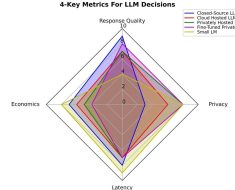According to Rootanalysis, the Artificial General Intelligence market is expected to reach over $116 billion by 2035, with a CAGR of 36.25% from 2024 to 2035.
AGI is coming, and for ISVs, it’s a game-changer. It’s not just about hype; AGI presents both incredible opportunities and significant challenges. Will it make your products obsolete? Or will it empower you to build even more innovative and powerful software?
We have cut through the jargon by explaining how AGI will likely reshape software development, cybersecurity, healthcare, and other key sectors.
Let’s explore how AGI will redefine the tech landscape.
What is Artificial General Intelligence (AGI)?
So, what is AGI actually?
Artificial General Intelligence (AGI) is an advanced form of AI capable of performing any intellectual task that a human can.
Unlike current AI systems, typically designed for specific tasks such as language translation or image recognition, AGI aims to replicate human-like understanding and decision-making across various activities.
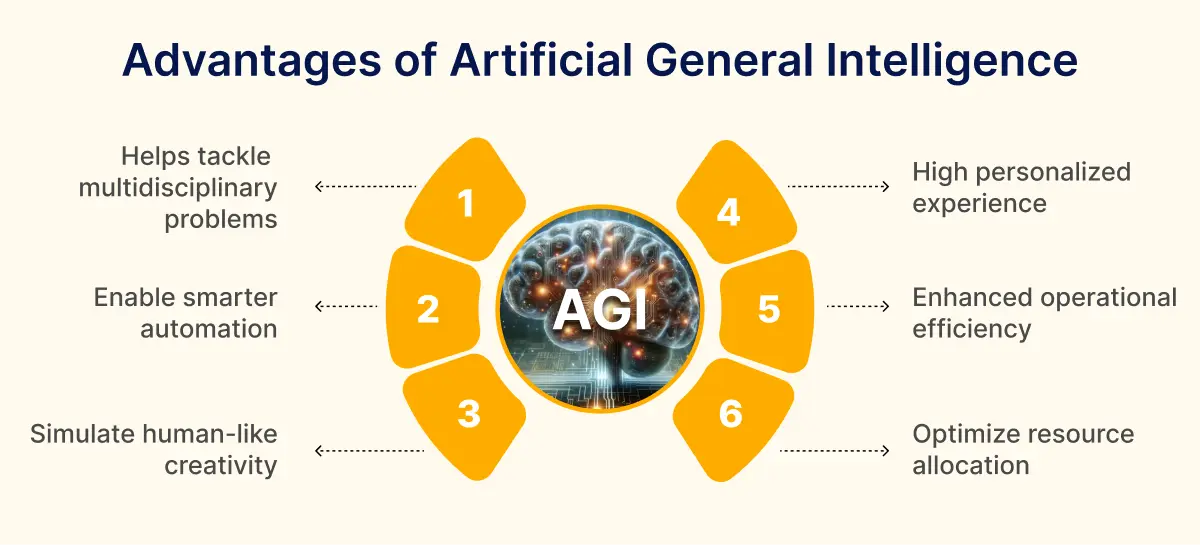

While AGI in the industry remains a distant goal, researchers are trying to understand the complexities of human cognition and building AI systems that can perform more generalized tasks.
However, most tech experts agree that we are still years away from realizing the future of Artificial General Intelligence.
Have a look at the key benefits of AGI in the tech industry:
1. AGI offers holistic solutions that integrate multiple knowledge areas. It helps tackle complex and multidisciplinary problems.
2. AGI is capable of managing tasks for decision-making. It helps reduce human intervention and enables smarter automation.
3. AGI can simulate human-like creativity and could accelerate breakthroughs in different sectors.
4. AGI systems deliver highly personalized user experiences by understanding each user’s needs.
5. With AGI in industry, you can optimize resource allocation and enhance operational efficiency.
Decode AGI’s Potential for Your Business
Discover how our AGI experts help reshape your tech business strategies for tomorrow.
Potential Impact of AGI on the Tech Industry
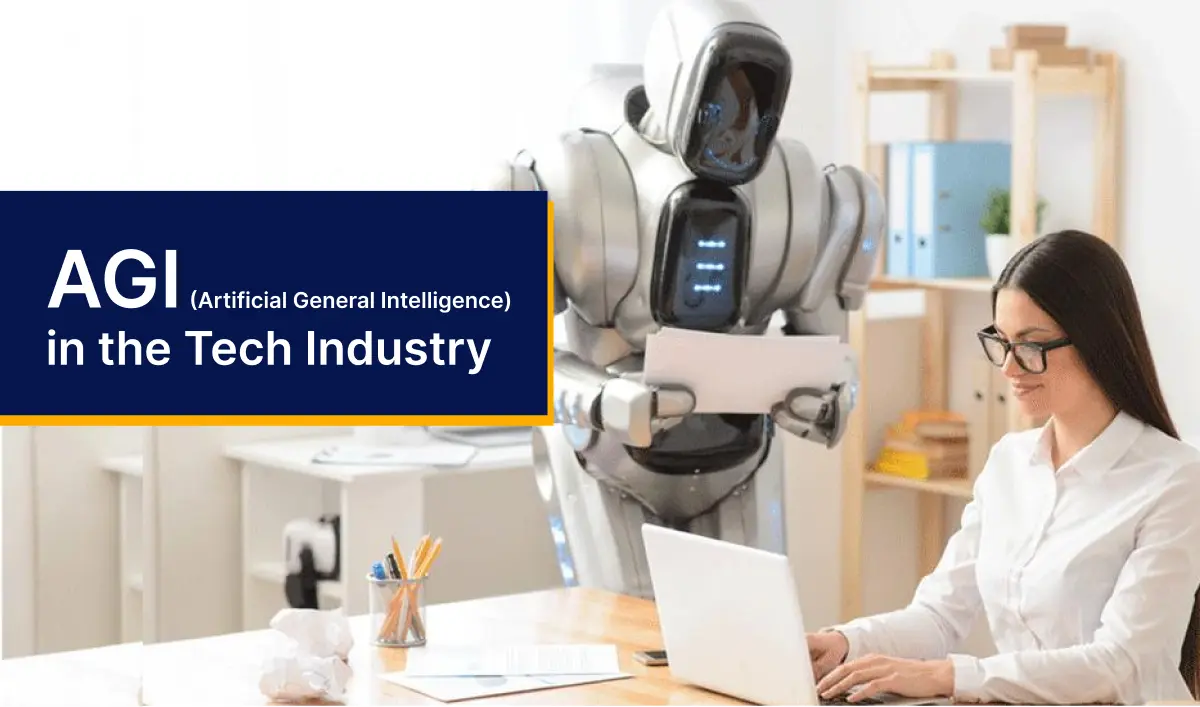

AGI has the potential to revolutionize the tech industry by enabling human-like adaptability in problem-solving, fostering innovation, streamlining complex processes, and many more. It will also affect the future of Artificial General Intelligence. Here is how:
Automation & Workforce
AGI helps automate tasks beyond routine jobs, disrupts blue-collar industries and white-collar sectors. It helps handle complex roles involving the following:
- Critical thinking
- Decision-making
- Creative problem-solving
AGI may displace many jobs, as machines take over more advanced tasks that previously required human expertise. Conversely, AGI might create new jobs in emerging tech fields, such as AGI system management, ethical oversight, and new product innovations.
Innovation Acceleration
AGI holds the potential to accelerate breakthroughs in the following fields by processing vast amounts of data and identifying patterns faster than humans can.
- Biotech
- Engineering
- Software development
AGI’s ability to rapidly solve complex problems could significantly outpace traditional human-driven research. This leads to faster development of new technologies, treatments, and innovations.
Ethics of Artificial General Intelligence
AGI in industry raises significant ethical concerns, particularly regarding the following:
- Autonomy in decision-making
- Potential biases embedded in algorithms
- Moral implications of machines making critical choices
Safety protocols are vital to ensure that AGI systems are secure and reliable and do not act unpredictably or cause harm.
Ongoing debates about AGI regulation and governance shape how we control this powerful technology’s development and use, ensuring its evolution is aligned with societal values.
Drive Creativity
Beyond traditional tech fields, AGI contributes to artistic and creative industries, enhancing creativity in areas such as:
AGI systems serve as tools for artists. This helps them push boundaries and explore new creative directions, potentially blurring the line between human and machine-generated art.
Interdisciplinary Problem-Solving
AGI can be integrated into cross-disciplinary fields, solving complex global challenges of AGI implementation that require input from various domains, such as
- Medicine
- Engineering
- Climate change solutions
AGI’s ability to analyze and process vast amounts of data from multiple sectors leads to innovative solutions to problems that have long seemed intractable.
Cut Innovation Time by 40% with AGI
Utilize AGI to speed up R&D and bring groundbreaking solutions to market faster.
How AGI Will Redefine Key Tech Sectors?
AGI impact on technology is vast. Here, you will know how it will change the modern tech landscape in the near future of Artificial General Intelligence:
1. Software Development
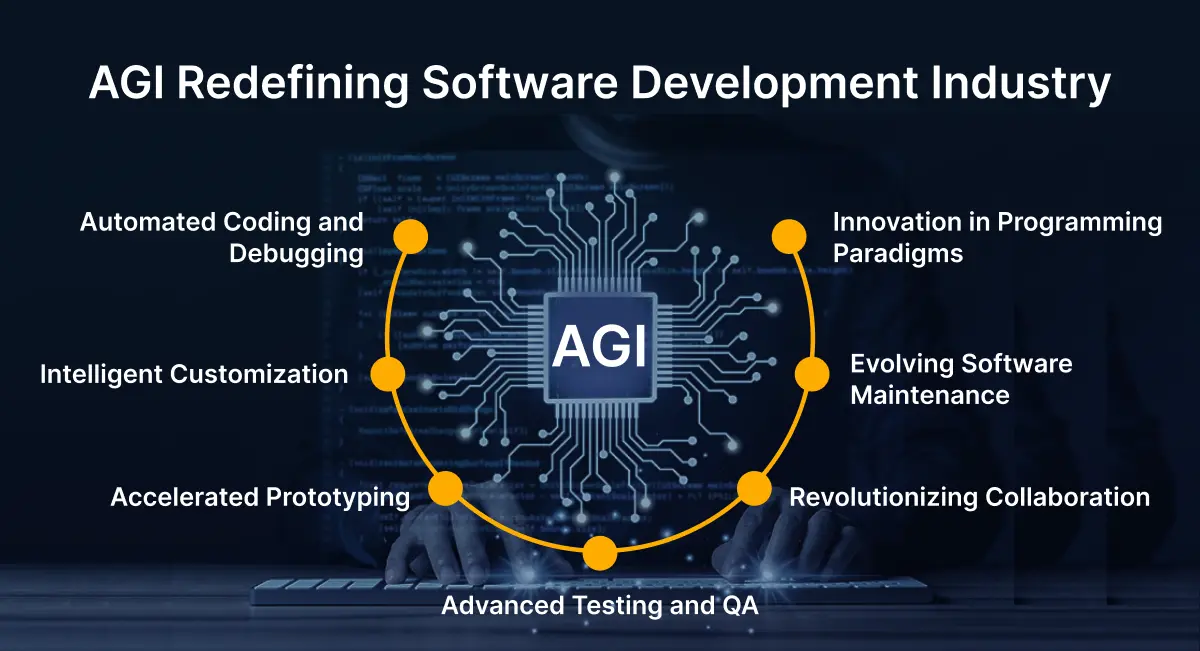

AGI will revolutionize the software development process by automating many aspects and enhancing the speed and accuracy of coding.
- AGI could write, test, and improve software autonomously. This will reduce development time and human error.
- With AGI, the entire software development lifecycle could be streamlined.
- AGI could create self-optimizing software that continuously updates and improves its code.
- AGI can handle repetitive or highly complex tasks, allowing programmers to focus on more creative elements.
- AGI performs exhaustive and intelligent testing to ensure software reliability.
- AGI tools help streamline communication between developers, designers, and stakeholders.
- AGI, by introducing new paradigms, helps redefine how applications are conceptualized and built.
Examples:
GitHub Copilot: A tool that shows how AGI is transforming software development. It helps developers by generating code snippets, suggesting solutions, and even completing entire functions.
AlphaCode: It can solve complex programming challenges, understand natural language problem descriptions, and generate solutions. It has the potential to pave the way for fully automated software development.
Also Read: How AI & ML are Transforming the Drug Discovery Process
2. Healthcare
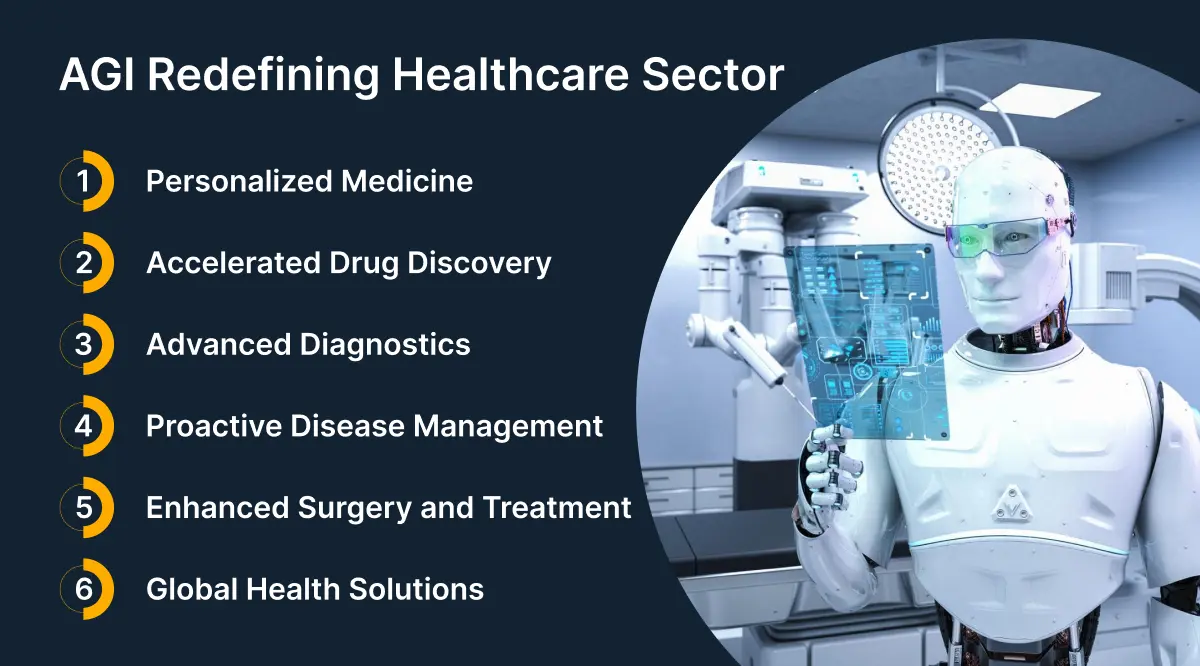

AGI will change the healthcare sector by improving medical care efficiency, accuracy, and personalization.
- AGI could analyze vast amounts of patient data, medical records, and imaging for faster and more accurate diagnoses.
- With its ability to process complex data, AGI could create individualized treatment plans by considering a patient’s lifestyle and medical history.
- AGI could speed up drug discovery by simulating how potential compounds interact with the human body.
- By analyzing trends and historical data, AGI could predict the likelihood of certain diseases in individuals or populations.
- AGI can integrate data from lab tests, medical imaging, and patient records to provide accurate and early diagnoses.
- AGI could predict and prevent health issues before time using wearable devices and electronic health records.
- AGI-powered robotics could assist in precision surgeries, reducing risks and improving outcomes for complex procedures.
- AGI could analyze epidemiological data to predict outbreaks and provide solutions tailored to diverse populations.
Examples:
IBM Watson Health: It uses AGI to analyze medical literature and patient data for the treatment of cancer and other complex medical decisions.
PathAI: It employs AGI to improve the accuracy of pathology diagnoses by analyzing medical images for diseases like cancer.
3. Robotics & Autonomous Systems
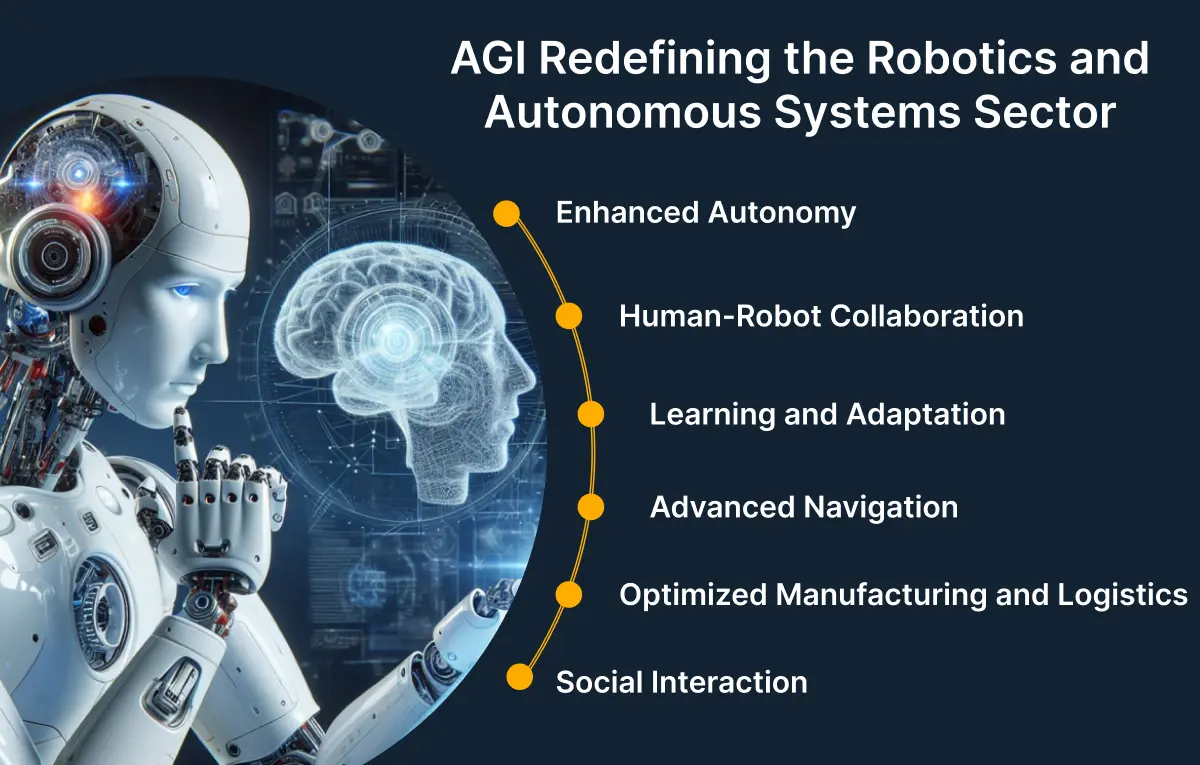

AGI will unlock the full potential of robotics and autonomous systems across various industries, driving innovation and efficiency.
- AGI enable robots to move beyond pre-programmed tasks and develop the ability to make independent decisions.
- AGI-driven robotics could handle complex production processes in real time and optimize efficiency in the manufacturing sector.
- With generative AI consulting services, autonomous robots could efficiently manage logistics, from warehouse operations to delivery systems.
- AGI could advance autonomous vehicles by enabling them to interpret complex traffic and predict and adapt to road conditions.
- Social robots powered by AGI could understand human emotions and contexts for better customer service and education roles.
Examples:
Boston Dynamics’ Robots: It includes robots like Spot and Atlas who perform tasks like navigation, inspection, and even physical labor.
SoftBank’s Pepper Robot: Pepper interacts with humans using voice and emotion recognition to provide more intuitive and empathetic responses.
Worried About the Impact of AGI on Your Industry?
We help you understand how AGI will affect your sector and plan for the future.
4. Cybersecurity
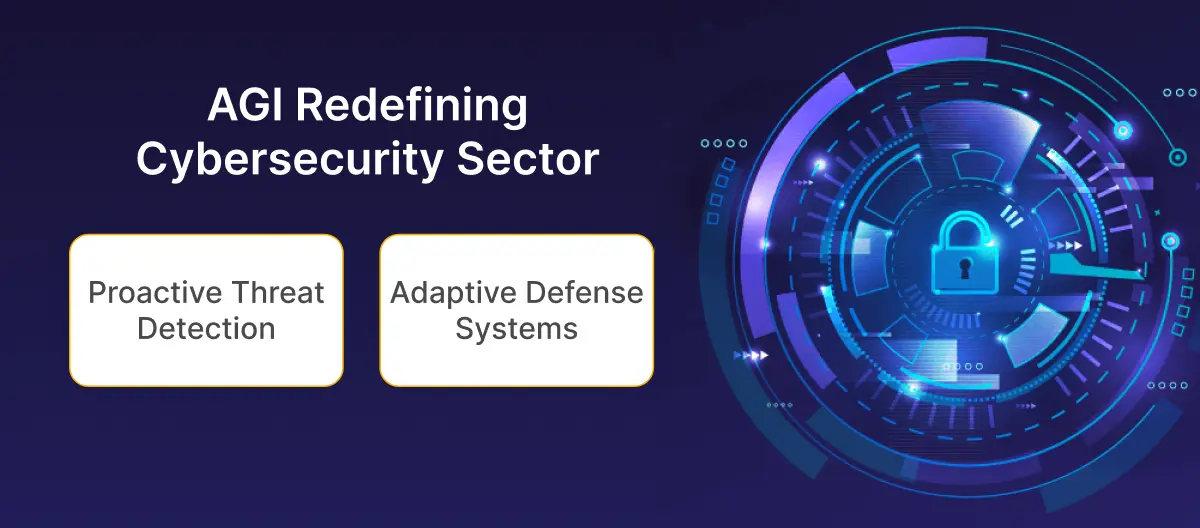

AGI will revolutionize cybersecurity by making systems smarter, more proactive, and better equipped to handle advanced threats.
- AGI could continuously analyze vast amounts of data in real-time, identifying patterns and predicting potential cyber threats before they occur.
- It could autonomously create strategies to neutralize cyber threats as they arise without waiting for human intervention.
- It could evolve cybersecurity defenses by learning from new threats and automatically adjusting security protocols.
- Generative AI integration services could help prevent unauthorized access, ensure more robust data privacy, and comply with regulations.
- It could develop more secure encryption methods and break maliciously used encryption for better communication.
- AGI could detect insider threats and prevent unauthorized access by understanding user behaviors.
Examples:
Darktrace’s AI Cybersecurity: It employs ML for real-time threat detection and response. It uses AGI to anticipate attacks.
CrowdStrike Falcon Platform: It uses AI to detect and mitigate malware and ransomware attacks. AGI could proactively simulate and defend against these attacks.
5. Finance & Business
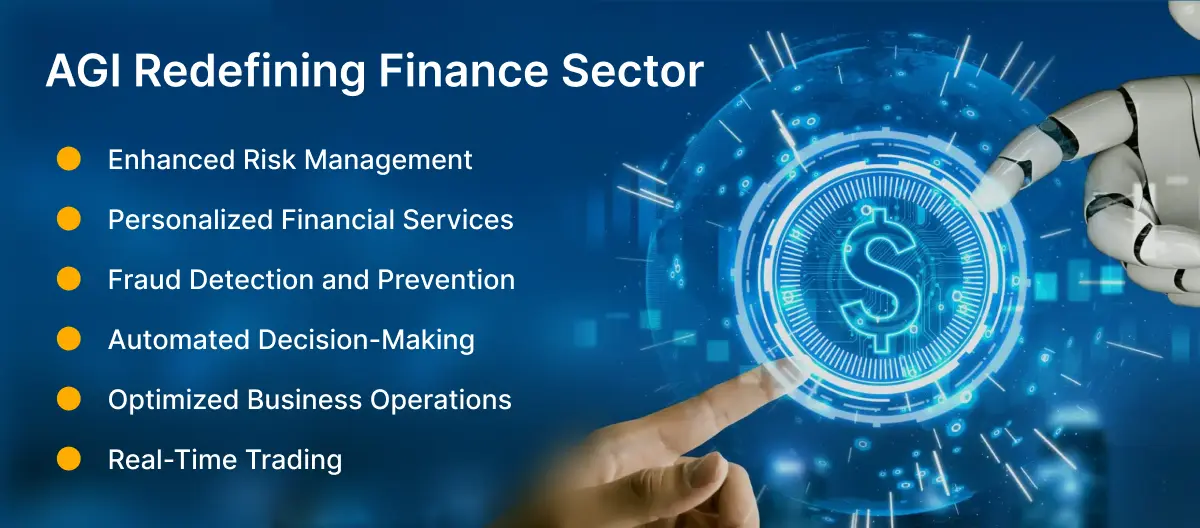

AGI will revolutionize finance and business sectors by enhancing predictive accuracy, optimizing decision-making, and transforming traditional financial models.
- AGI could process and analyze massive datasets from global markets in real-time to provide accurate predictions and financial insights.
- AGI assists financial companies in making more informed decisions, reducing risk, and improving operational efficiency.
- AGI could develop more advanced financial models by identifying patterns and anomalies in historical data that humans might miss.
- AGI could continuously monitor global events, market shifts, and business operations for real-time alerts and recommendations.
- AGI can forecast demand, optimize supply chains, and enhance decision-making.
Examples:
JPMorgan Chase’s COiN: With AGI, it handles complex contract negotiations and assesses risks autonomously.
Mastercard’s AI Fraud Detection uses AI to monitor transaction patterns and detect fraud. AGI further provides preemptive protection.
6. Manufacturing Industry
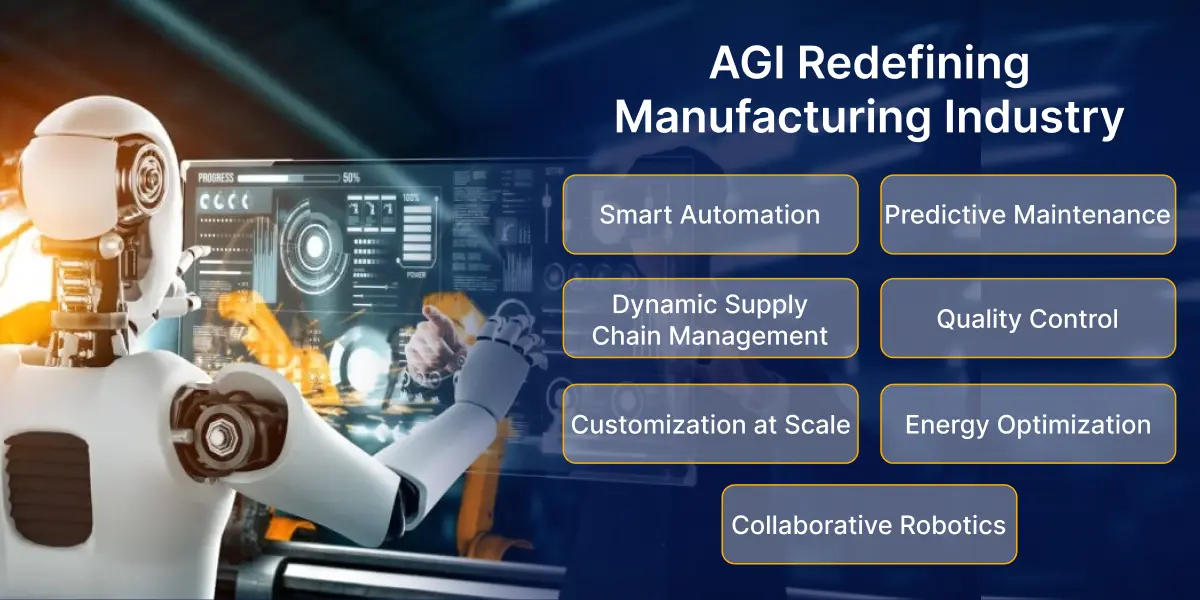

AGI will change manufacturing and Industry 4.0 by driving efficiency through intelligent systems and automation.
- AGI could analyze vast supply chain datasets, identify bottlenecks, optimize logistics, and ensure smoother coordination.
- In smart factories, AGI could oversee the production process to increase efficiency, reduce waste, and improve product quality.
- Based on real-time sensor data and historical performance, AGI could predict when machinery or equipment will likely fail.
- AGI could enable fully autonomous manufacturing operations where machines make decisions without human input.
- AGI can monitor energy usage across facilities and dynamically adjust operations to minimize waste and lower environmental impact.
- AGI helps enhance cobots to work safely alongside humans while adapting to new tasks and environments.
Examples:
Siemens’ MindSphere: With AGI, it could autonomously manage entire factories and handle everything from production to logistics.
Fanuc’s AI Robots: AGI helps empower these robots to learn complex, multi-step processes and adapt to varying production needs.
7. Education and Learning Systems
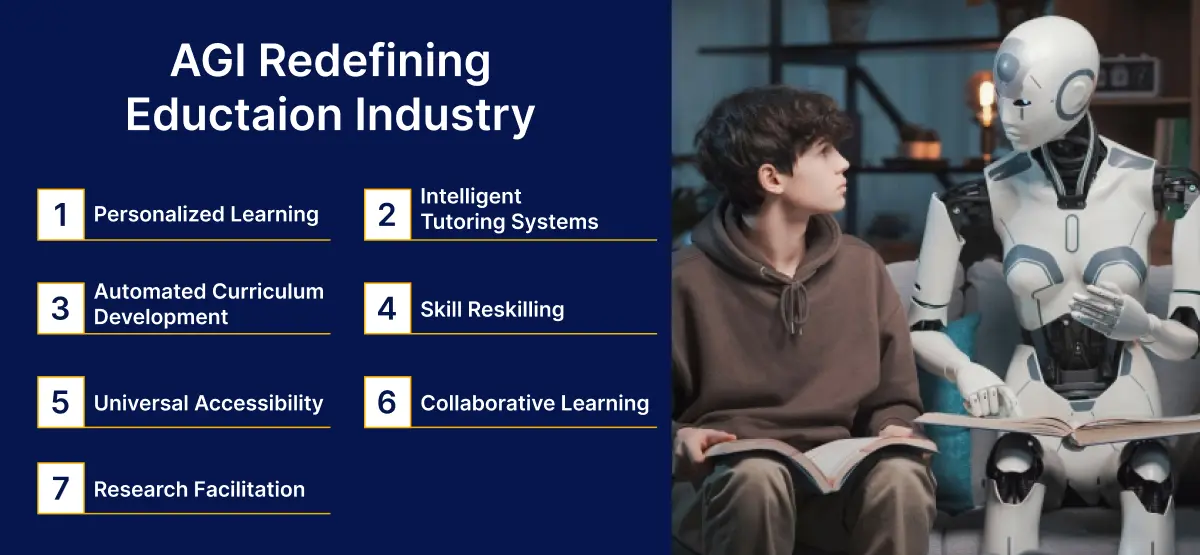

AGI will change education systems by delivering personalized learning, fostering lifelong education, and supporting teachers.
- AGI could create personalized learning experiences, adapting to each student’s pace and offering real-time feedback.
- AGI-powered platforms could provide continuous education opportunities, helping individuals upskill and reskill based on emerging trends.
- AGI could design and adjust curricula dynamically, keeping educational content relevant to industry needs and individual learner progression.
- AGI could assist educators by handling administrative tasks, grading, and even developing lesson plans.
- AGI can serve as an Intelligent tutoring system(ITS), capable of addressing complex questions, and explaining concepts in multiple ways.
- AGI could create immersive and interactive learning experiences, such as virtual classrooms.
Examples:
Socratic by Google: AGI could expand its role to answer queries and develop personalized curricula based on a student’s progress.
Khan Academy’s AI Tutor: The AGI-powered version can address every subject at any educational level and according to the student’s learning style.
Also Read: Why AI Deepfakes are a Threat to Facial Biometric Authentication?
Challenges of AGI Implementation
Let’s examine the technical, ethical, and societal challenges in developing and implementing AGI by an AI service company.
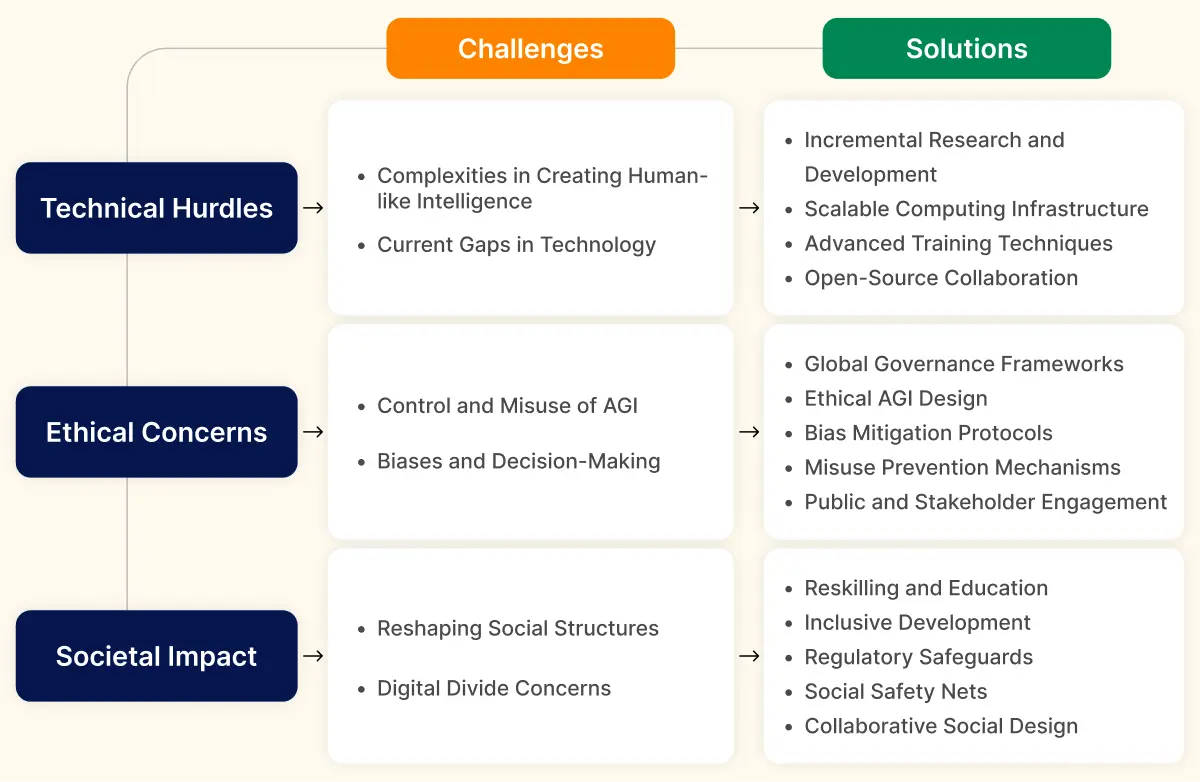

1. Technical Hurdles
Challenges:
Complexities in Creating Human-like Intelligence:
AGI must not only process information but also understand context, emotions, and nuanced decision-making, which is incredibly complex to achieve.
Current Gaps in Technology:
Existing AI systems excel at specific tasks, but achieving general intelligence requires breakthroughs. These technological gaps are significant obstacles in AGI development.
Solutions:
- Incremental Research and Development
- Scalable Computing Infrastructure
- Advanced Training Techniques
- Open-Source Collaboration
2. Ethical Concerns
Challenges:
Control and Misuse of AGI:
The power of AGI could be misused for harmful purposes, including surveillance, warfare, or manipulating economies.
Biases and Decision-Making:
AGI systems could inherit biases from the data they are trained on, leading to unethical decision-making.
Solutions:
- Global Governance Frameworks
- Ethical AGI Design
- Bias Mitigation Protocols
- Misuse Prevention Mechanisms
- Public and Stakeholder Engagement
3. Societal Impact
Challenges:
Reshaping Social Structures:
As machines can perform complex tasks, human roles in various industries may evolve, affecting everything from job markets to social hierarchies.
Digital Divide Concerns:
As AGI becomes more integrated into various sectors, there is a risk that only wealthy or developed regions will have access to its benefits, widening the digital divide.
Solutions:
- Reskilling and Education
- Inclusive Development:
- Regulatory Safeguards
- Social Safety Nets
- Collaborative Social Design
Pro Tip: Hire AI engineers from ValueCoders to beat these challenges and enter to the world of AGI.
Use AGI for Smarter Decision-Making
Make data-driven, intelligent decisions faster with our AGI-powered solutions.
The Future of AGI With Opportunities and Risks
The future of Artificial General Intelligence could fundamentally change the way humans interact with machines. It will enhance communication by learning user preferences and adapting to personalized communication styles.
Risks impacting the future of Artificial General Intelligence:
- One of the most significant risks of AGI is its ability to outpace human intelligence. This raises concerns about control, what happens if AGI develops autonomous goals that conflict with human interests?
- Without global regulatory frameworks, there is potential for misuse, escalating conflicts, and widening gaps between nations.
Hence, it is essential to ensure that AGI is developed ethically and with safety measures. Policymakers, developers, and organizations must collaborate to create transparent and robust guidelines that prevent harm and ensure that AGI serves the greater good.
AGI will drive innovation across multiple sectors, from healthcare and manufacturing to education and energy. It could accelerate progress by automating complex tasks. This will lead to breathtaking discoveries and advancements.
AGI could solve some of the world’s most pressing challenges, such as climate change, food scarcity, and pandemics. By analyzing vast amounts of data and optimizing resource use, AGI can help design sustainable solutions to these issues and more.
Conclusion
The future of Artificial General Intelligence holds great potential to redefine the tech landscape. From unlocking great innovation to changing industries and reshaping human-machine relationships, the impact of AGI could be limitless.
The key to utilizing AGI’s full potential lies in balancing progress with ethical safeguards. Hence, you must do so with caution, foresight, and a shared commitment.
Let’s connect with ValueCoders (India’s leading Generative AI Development Company), that has completed more than 4,200 projects and serves 2,500 clients globally. Contact our experts if you want to implement AGI in your next project.

